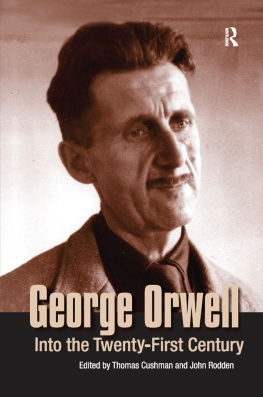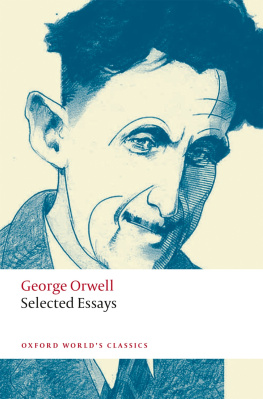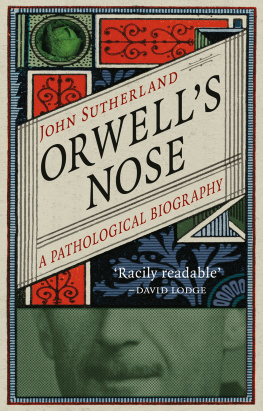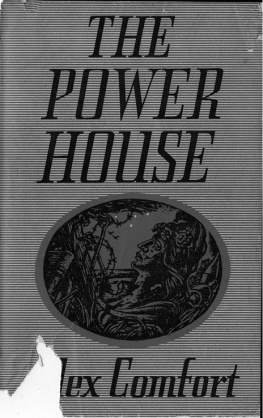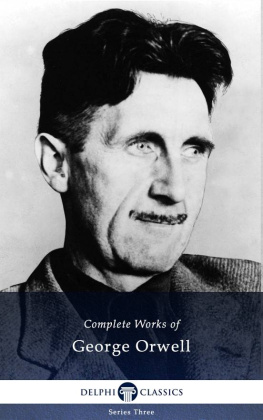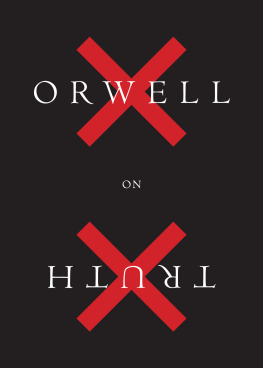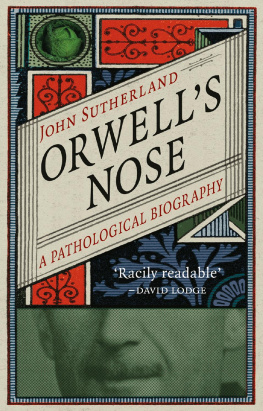
GEORGE ORWELL
GEORGE ORWELL
INTO THE TWENTY-FIRST CENTURY
EDITED BY
THOMAS CUSHMAN AND JOHN RODDEN

First published 2004 by Paradigm Publishers
Published 2016 by Routledge
2 Park Square, Milton Park, Abingdon, Oxon OX14 4RN
711 Third Avenue, New York, NY 10017, USA
Routledge is an imprint of the Taylor & Francis Group, an informa business
Copyright 2004, Taylor & Francis.
Chapter 3, Hope against Hope: Orwells Posthumous Novel, copyright 2004 by
Morris Dickstein
All rights reserved. No part of this book may be reprinted or reproduced or utilised in any form or by any electronic, mechanical, or other means, now known or hereafter invented, including photocopying and recording, or in any information storage or retrieval system, without permission in writing from the publishers.
Notice:
Product or corporate names may be trademarks or registered trademarks, and are used only for identification and explanation without intent to infringe.
Library of Congress Cataloging-in-Publication Data
George Orwell: into the twenty-first century / edited by Thomas Cushman and John Rodden.
p. cm.
ISBN 1-59451-002-4 (hardcover : alk. paper) ISBN 1-59451-003-2 (pbk : alk. paper)
1. Orwell, George, 1903-1950Criticism and interpretation. I. Cushman, Thomas, 1959
II. Rodden, John.
PR6029.R8Z6397 2004
828.91209dc22
2004014919
Designed and Typeset by Straight Creek Bookmakers.
ISBN 13: 978-1-59451-002-1 (hbk)
ISBN 13: 978-1-59451-003-8 (pbk)
Contents
THOMAS CUSHMAN
Chapter 1
Abolishing the Orgasm: Orwell and the Politics of Sexual Persecution
JONATHAN ROSE
Chapter 2
In Defense of Comrade Psmith: The Orwellian Treatment of Orwell
IAN WILLIAMS
Chapter 3
Hope against Hope: Orwells Posthumous Novel
MORRIS DICKSTEIN
Chapter 4
George Orwell and the Liberal Experience of Totalitarianism
CHRISTOPHER HITCHENS
Chapter 5
On the Ethics of Admirationand Detraction
JOHN RODDEN
Chapter 6
The Public Intellectual as Connected Critic: George Orwell and Religion
RONALD F. THIEMANN
Chapter 7
Orwell, Pacifism, Pacifists
LAWRENCE ROSENWALD
Chapter 8
Varieties of Patriotic Experience
TODD GITLIN
Chapter 9
Vulgar Nationalism and Insulting Nicknames: George Orwells Progressive Reflections on Race
ANTHONY STEWART
Chapter 10
Orwells Smelly Little Orthodoxiesand Ours
JIM SLEEPER
Chapter 11
Orwell in an Age of Celebrity
JONATHAN B. IMBER
Chapter 12
Writing about Orwell: A Personal Account
PETER STANSKY
Chapter 13
Orwell: Unmasker of Underlying Realities
DENNIS WRONG
Chapter 14
Third Thoughts about Orwell?
DAPHNE PATAI
Chapter 15
Orwells Perversity: An Approach to the Collected Essays
WILLIAM E. CAIN
Chapter 16
Prescience and Resilience in George Orwells Political Aesthetics
LYNETTE HUNTER
Chapter 17
Outside/Inside: Searching for Wigan Pier
MARGERY SABIN
Chapter 18
Orwells Satirical Vision on the Screen: The Film Versions of Animal Farm and Nineteen Eighty-Four
ERIKA GOTTLIEB
Chapter 19
George Orwell: Russias Tocqueville
VLADIMIR SHLAPENTOKH
Chapter 20
May Days in Barcelona: Orwell, Langdon-Davies, and the Cultural Memory of War
MIQUEL BERGA
Chapter 21
From Ingsoc to Capsoc: Perceptions of Orwell in France
GILBERT BONIFAS
Thomas Cushman wishes to thank Wellesley College, and several of its academic departments, for its enthusiastic financial and technical support for the George Orwell Centenary Conference, which was held May 13, 2003. A particular note of thanks is due to the Committee on Lectures and Cultural Events for providing most of the resources for the conference and to the director of special events, Mary Morris. Beyond that, a number of offices and individuals at Wellesley were instrumental in helping to make the conference, and therefore this volume, a success. The broad support of many departments and colleagues at Wellesley is testament to the colleges intellectual environment. Special mention and praise is due to Jennifer Redfearn, who helped to organize and execute all of the details of the conference. Also due special thanks is William Cain of the Department of English at Wellesley College who was a persistent and knowledgeable collaborator and supporter. Kevin Alexander assisted in assembling and editing the final drafts of all of the essays and communicating with authors. Finally, I would like to thank John Rodden, who is my intellectual guide on things related to Orwell and much else. As the co-organizer of the Orwell Centenary Conference and coeditor of the volume, John worked closely with all of the authors whose essays appear in this volume, and editorial improvements to the essays are due primarily to his efforts.
The editors enjoy a special and serendipitous intellectual and personal relationship that generated and incubated the idea for the George Orwell Centenary Conference, brought it to realization, and made it possible to produce the present volume. Both of us would concur with Horace: Quia natura mutari non potest idcirco verae amicitiae sempiternae suntSince nature cannot change, true friendships are eternal.
John Rodden expresses his gratitude first to Thomas Cushman, whose intellectual acumen has made our dialogues about Orwell always stimulatingand whose practical expertise in conference organizing made the Orwell symposium the academic highlight of the Orwell centennial year. I consider it my good fate and fortune both to have met Tom in the year 1984 and to count him today as my intellectual (big) brother. Mitch Baranowksi, a former student and longtime friend, also deserves my deep thanks for his brilliant work in directing Does Orwell Matter? (the documentary film that emerged from the conference). I am also grateful to Lynn Hayden, a special friend and an inspiring presence throughout the Orwell conference. Lynn helped make the interviews for the film run smoothly in countless small ways. Finally, I too would like to acknowledge William Cain, whose outstanding intellectual contributions and personal generosity played a significant role behind the scenes to assure the success of the Orwell conference.
George Orwell into the Twenty-first Century
THOMAS CUSHMAN
On May 1 through 3, 2003, Wellesley College hosted the George Orwell Centenary Conference, which was the single largest world event commemorating Orwells life and work on the hundredth anniversary of his birth. The event featured leading Orwell scholars, writers, and public intellectuals who have been influenced by Orwells thinking and who engaged Orwells work as a catalyst for their own thinking on a wide variety of issues. The essays assembled in this volume are a result of this conference and testify to the sustained interest in this most enigmatic of writers and to his enduring influence into the twenty-first century.
There is a curious irony in such a commemorative event. As is well known, Orwell willed that no biography of him should appear after his death, perhaps an entirely unreasonable expectation given his prominence in twentieth-century literary life. The event would probably have been disdained by Orwell himself. One imagines that his desire not to be the subject of a biography or centenary conference might be based on his suspicion of the possibilities of hagiography implicit in such enterprises. To be sure, as several authors in this volume point out, there has been much sanctification of Orwell since his death.
Next page
